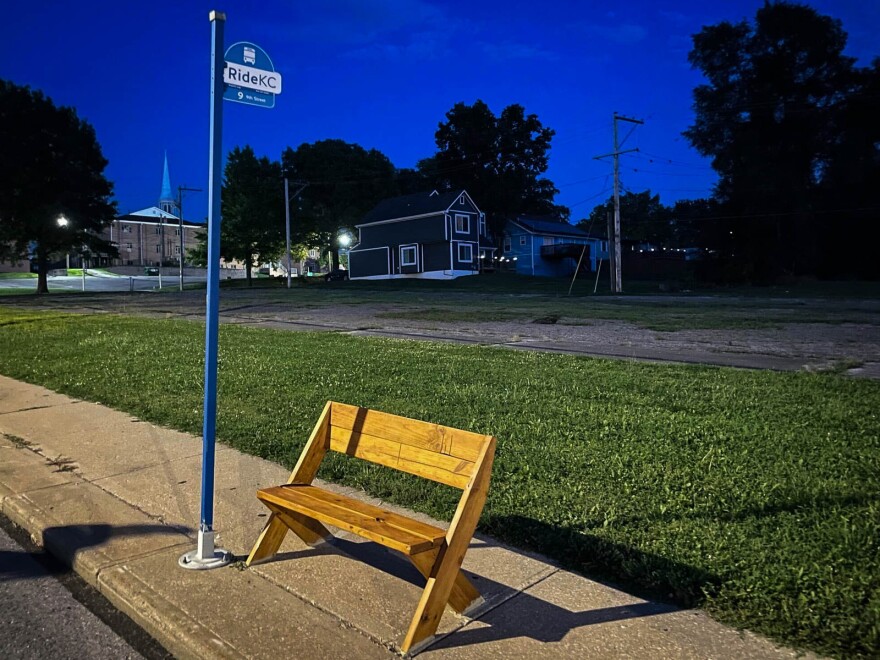There aren’t many benches at bus stops around the Kansas City metro. At most stops, riders have to wait for their bus between 15 minutes to an hour in the rain, heat, snow or frigid cold with no place to sit.
Sunrise Movement KC, a climate activist group, is trying to change that. The group has been placing DIY benches at bus stops around the metro. Jacob Antolini, an organizer with Sunrise, said the group has installed more than 20 benches since it started the effort last fall.
But the Kansas City Area Transportation Authority keeps removing them. Antolini said the DIY benches were started as a tangible and quick way for people to take part in the group’s transit activism. Sunrise Movement KC has also advocated for regional transit funding, as well as fast and frequent bus service.
“The real impetus for us to lead this bench building project was to explicitly show the city council and KCATA that we can do great things and dignified things for our bus riders, but there's something holding us back,” Antolini said. “It's not the people of Kansas City, it's the people who are in charge of our bus system.”

Sunrise will host its second community bench build this Saturday, Nov. 15. Nearly 200 people have already RSVP’d for the event, which will include music, snacks, building and painting stations for the benches, and food packages for those who are struggling to make ends meet.
Antolini hopes that more than 30 benches will be built, ready to be placed at various bus stops across the city.
Groups like Sunrise have been putting in DIY benches across the country, including near Kansas City in St. Louis; Chattanooga, Tennessee; and Nashville, Tennessee. The city of Richmond, California, recently legalized homemade bus stop benches after a group there installed them.
But the KCATA will remove the benches Sunrise installs as soon as it finds them at the stops.
Tyler Means, the chief mobility and strategy officer at the KCATA, said the transportation agency has to remove the benches due to liability concerns. He said the agency already has to pay out settlements to people who are injured at stops or on buses, and “can’t add that to the list.”
“The more liability we have and the more money we spend in the courts to deal with somebody getting injured, like on a bench that we have no control over, that's money that's taken away from the service we can put in the field,” Means said.

According to data obtained by KCUR, the KCATA has benches at around a quarter of its permanent stops around the metro.
Cindy Baker, a spokesperson for the KCATA, said the agency has removed 70 of its own benches since 2022. Most were removed due to requests from the Kansas City Police Department or when suburbs, like Independence and Gladstone, have ended their bus service.
The agency’s number includes the leaning benches the KCATA installed this summer at a number of stops in downtown Kansas City. Many riders on social media called the leaning benches, which are meant to prevent people from sitting down, “insulting.”
Antolini said the leaning benches may technically be compliant with the Americans with Disabilities Act, but he believes they aren’t usable for many people — like the elderly and those with disabilities.
“I can guarantee you that every rider, 10 out of 10 people would say they prefer our benches over (KCATA’s) leaning benches,” Antolini said. “Inclusivity should be a leading aspect of design. It's disgusting to me to hear that we have officials working in government that are using their authority as government officials to criticize improvements to their system.”

According to Means, the leaning benches were a pilot program from the KCATA, and the agency hasn’t installed any since they were initially introduced this summer. He said the KCATA places benches at bus stops based on the amount of ridership and usage the stops have. Those benches have specifications they have to abide by, which the DIY wooden benches do not comply with.
It costs anywhere from $6,000 to $8,000 for the KCATA to put a bench at a bus stop, according to Means, and then about $5,000 to maintain. But that doesn’t mean the KCATA wants a free bench that Sunrise provides. Means said the group hasn’t tried to collaborate with the agency to put in benches the right way.
“They will build them and just put them out, and there's no conversation, there's no engagement,” Means said. “There's just them, almost from a point of hostility, saying, ‘I put this out here because you took our stuff away and people deserve to sit down.’”
Means said instead of putting up DIY benches, Sunrise could join the KCATA’s adopt-a-stop program or join its Rider Advisory Council.
But Antolini said there’s been enough interest from the community to keep building benches, and it will continue until there are benches people can sit on at any stop they want them.






